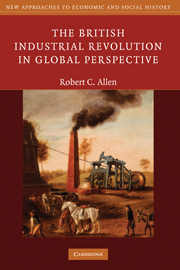Book contents
- Frontmatter
- Contents
- List of plates
- List of figures
- List of tables
- Acknowledgments
- 1 The Industrial Revolution and the pre-industrial economy
- Part I The pre-industrial economy
- 2 The high-wage economy of pre-industrial Britain
- 3 The agricultural revolution
- 4 The cheap energy economy
- 5 Why England succeeded
- Part II The Industrial Revolution
- References
- Index
3 - The agricultural revolution
Published online by Cambridge University Press: 05 June 2014
- Frontmatter
- Contents
- List of plates
- List of figures
- List of tables
- Acknowledgments
- 1 The Industrial Revolution and the pre-industrial economy
- Part I The pre-industrial economy
- 2 The high-wage economy of pre-industrial Britain
- 3 The agricultural revolution
- 4 The cheap energy economy
- 5 Why England succeeded
- Part II The Industrial Revolution
- References
- Index
Summary
The English are still imbued with that doctrine, which is at least debatable, that great properties are necessary for the improvement of agriculture.
Alexis de Tocqueville, Journey to England, 1833, p. 72Agriculture played an important role in the expansion of northwestern Europe. In the successful economies of England and the Low Countries, the share of the workforce in farming dropped from about 75 to 35–40 per cent. Since the British and the Dutch were being fed mainly with domestically grown food, each farm worker in these countries had to raise his productivity enough to feed more mouths than before. Not only that – in Chapter 2 we saw that British and Dutch farmers put more food on the table than farmers in other parts of Europe. How and why did they do it?
There is a well-established answer to this question, at least in so far as English agriculture is concerned, and it not only explains the agricultural transformation but also the development surge of the English economy as a whole (e.g. Brenner 1976, Cohen and Weitzman 1975, Ernle 1912, Marx 1867, McCloskey 1972, Overton 1996, Shaw-Taylor 2001, Young 1774, etc.). This theory is summarized in Figure 3.1. In this model, the modernization of agrarian institutions – the enclosure of the open fields and the replacement of peasant cultivators with large-scale capitalist farms operated by wage labour – was the prime mover that drove the economy forward (box one).
- Type
- Chapter
- Information
- The British Industrial Revolution in Global Perspective , pp. 57 - 79Publisher: Cambridge University PressPrint publication year: 2009



